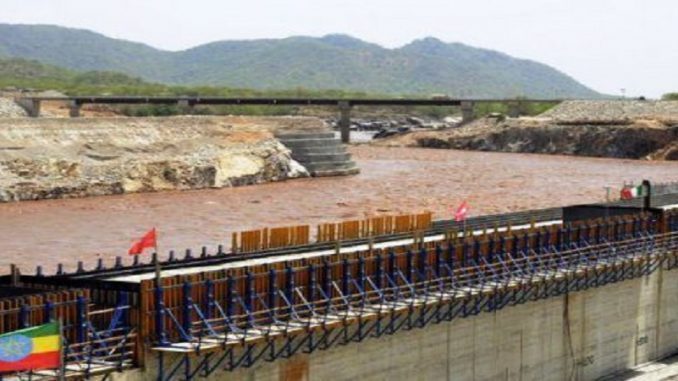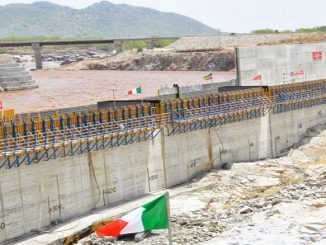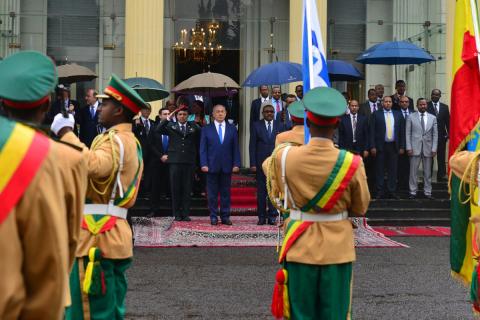
The foreign ministers of Sudan, Egypt, and Ethiopia have failed to reach an agreement in the lingering dispute over Ethiopia’s massive dam on the Blue Nile, ministers said on Friday.
Egypt is concerned that the Grand Ethiopian Renaissance Dam will drastically impact its own share of water from the Nile, on which the entire population relies. Ethiopia, like Egypt, has said that the dam issue is a “matter of life or death.”
Sudan’s Foreign Minister Ibrahim Ghandour said on Friday that 15 hours of talks in Khartoum have ended with no deal. The three countries’ intelligence chiefs and irrigation ministers also attended the talks.
Ghandour said that, nevertheless, “the meetings were constructive and important,” but that the three sides failed to “end up with satisfying answers.”
Egypt’s Foreign Minister Sameh Shokry confirmed the remarks in a report published by the daily al-Shorouk, adding that there will be another round of talks within 30 days.
The tripartite body was formed after a meeting including Presidents Omer al-Bashir, Abdel Fattah al-Sisi and former Prime Minister Hailemariam Desalegn on the sidelines of the African Union Summit in Addis Ababa on 29 January.
It includes foreign ministers, irrigation ministers and head of the security and intelligence agencies of the three countries.
Ghandour said that the irrigation ministers will discuss the outstanding issues in a meeting to be determined at a later date. The foreign ministers and head of security agencies will join them when they make progress on the technical issues.
However, he declined to elaborate on the outstanding issues when asked about that.
In March 2015, the three leaders signed in Khartoum a framework cooperation deal on the GERD. They said the “declaration of principles”would pave the way for further diplomatic cooperation on the GERD which has stirred fears of a regional resource conflict.
However, the three countries have failed to agree on the findings of the technical report related to the impact of the dam prepared by consultant companies, French firms BRL and Artelia.
Also, Cairo proposed to refer the matter to the World Bank, but Addis Ababa refused the Egyptian proposal.
Egypt fears Ethiopia’s $4.8 billion dam could reduce its Nile water share. Ethiopia has said it needs the dam for its development and is seeking to assure Cairo that it will not significantly harm it. The sticking point appears to be how quickly the reservoir behind the dam will be filled and if that will impact Egypt’s water share.
The Renaissance Dam is now 64 percent finished and Ethiopia hopes to become a key energy hub in Africa upon its completion.
Egypt has traditionally received the lion’s share of the Nile’s waters under agreements seen by other Nile basin nations as unfair. Former Egyptian presidents have warned that any attempt to build dams along the Nile will be met with military action.
Sudan appears to be taking Ethiopia’s side in the dam negotiations and has revived a longstanding border dispute with Egypt.
Ethiopia Remained Firm Not To Give Egypt Its Demand
Sources disclosed that the meeting between ministers of Ethiopia, Egypt, and Sudan in Khartoum over the impact of the Great Ethiopian Renaissance Dam (GERD) has come to an end but without any breakthrough.
Although the meeting stayed up until 3:30am, the talk was stalled because Ethiopia’s foreign minister” remained firm not to give in to Egypt’s demand that Ethiopia recognizes the 1959 agreement signed with Sudan on the Nile,” reported the Ethiopian independent newspaper Addis Fortune news.
“There was an obvious lack of goodwill,” said a diplomat who described the talk as tense. “Egypt technically wanted Ethiopia to respect the colonial agreement which is a red-liner. It’s the final line Worqneh would want to cross.”
The deadlock came after Egypt put its desire in the disclaimer on a draft agreement, which comprises cooperation on joint infrastructure fund as well as trade and investment, these sources disclosed.
Egyptian negotiators were seen pushing for political settlement, overcoming recommendations at a technical committee level, a diplomat said.
Ethiopian Media Slams Negative Reports About GERD As Irrelevant, Untimely
During the meeting, Ethiopian media reported that the Renaissance Dam has no negative effect on any country.
The Ethiopian Herald, the state-owned English newspaper, quoted a ministerial adviser who said that The reports of some international media to remind others about the harmful effects of the Grand Ethiopian Renaissance Dam (GERD) on the lower riparians is untimely and irrelevant.
The newspaper added,”Ethiopia requires no permission from any side to utilize its resources but undertakes the construction with sense of mutual benefit, just as the project progressed so far through mutual understanding it will continue until the end.”
Border and Cross-Border Rivers Affairs Advisor to the Minister, Tefera Beyene told the Ethiopian Herald that the construction of Great Ethiopian Renaissance Dam (GERD) has no impact over downstream countries, but it enables them to expand and develop agricultural activities, reduces the risk of water flood and ensures honesty in fair utilization of the resource.
Ethiopia is working to use and utilize the water fairly to benefit its citizens without affecting downstream countries and the construction close to be a reality, he added. He indicated that the construction of GERD expands the current amount to triple the power. It has a capacity to generate 16 thousand Gigawatts per hour, he added.
“More than 86 percent of the water is from Ethiopia. Ethiopia has a sovereignty or autonomous right, responsibility and obligation to use and utilize the water for its citizens respecting the benefits of downstream countries,” he added.
Tefera stressed that the construction of GERD extends the life of water institutions and reduces the repairing expense of downstream countries. However, countries protest ongoing activity as their need not to change the real situation, the great thing about them is the loss of trust when controlling water. ”
This is not right. Ethiopia needs to utilize the water based on justice and reason. To apply this situation, we ratified legal framework previously. We have made agreements with all Nile sharing countries to utilize water fairly. We want all water sharing countries to use the resource fairly,”he added.
He emphasized that Ethiopia never allow superiority benefit of one country and we are working all countries to utilize it fairly and legally. He also noted that the great thing about the construction of the great Ethiopian renaissance dam is the issue which cannot reverse back in developing it.
Ethiopian Media Wrote: GERD Expression of Ethiopia’s Sovereignty
Prior to the meeting, the Ethiopian media has written that the Renaissance Dam is an expression of Ethiopia’s sovereignty.
“The Grand Ethiopian Renaissance Dam (GERD) has now become a very important part of the life of each and every Ethiopian. It is considered that it is the symbol of the nation, an expression of its sovereignty. It has created a new sense of optimism and consensus among the population. This is clear in that the fingerprints of every Ethiopian are sealed on it as it is owned by each citizen,” wrote the Ethiopian Herald.
Moreover, the Ethiopian Herald, owned by the Ethiopian government, mentioned that Ethiopia has never made any meaningful use of the water due to a number of factors. It stated that one of the main reasons is the influence of the downstream countries,”But no one can deny the contribution of the campaign and influence of the downstream countries and their allies who would block any financial support to Ethiopia to carry out a project on the river.”
“The reluctance of the world financial institutions to back Ethiopia on any of the projects it would carry out on the Nile could only be explained in connection to Egypt, a force to be reckoned with due to its clouts in the geopolitics of the sub-region,” according to the Ethiopian Herald.
It added,”History is witness that all the treaties regarding the use of the water of the Nile have been carried out in complete disregard of the main source of the river. What is more, the question has always been considered as a matter of sovereignty and dignity while generations of Ethiopians could hardly do anything to redress this massive historical wrong.”
“Beginning from Imperial times, Ethiopia did envisage to make some use of the Nile; but its financial clout was not so strong to see any project realized on its own. It needed support, but no one dared to support. For years the dream of Ethiopians to use legitimately and reasonably the waters of the Nile was frustrated.”
“The late Prime Minister Meles has advocated clearly this idea and explained the priorities of the country to all interested parties and finally, he laid the cornerstone for the construction of the Grand Dam seven years ago. For Meles, there was no convincing logical reason why Ethiopia could not make the most use of the Nile in accordance with international norms. This is a question of sovereignty,” according to the Ethiopian newspaper.
It also added.”Naturally, Ethiopia argues it cannot be bound by outdated colonial treaties that excluded her. The fact that Ethiopia, the most important source of the river, has not even been consulted during the formulating of the treaties can only show the extent of arrogance and ill will of those who fixed the accord. No other word can explain better this perspective than ‘humiliation’.”
Accordingly, there is no doubt that there is no turning back in the Renaissance Dam issue and it was quite obvious that Ethiopia slams the “historical treaties”, that Egypt demands; as the recognition of 1959 treaty with Sudan.
Ethiopia defends the dam as a matter of sovereignty and at the same time, it is gaining time until it finishes the dam completely and at this moment, Egypt’s share will be in a great trouble.
Last month, Ethiopian officials declared that Addis Ababa will begin testing the Grand Ethiopian Renaissance Dam (GERD) for electricity generation, to determine if it can produce 6.450 megawatts of electricity upon completion.
Abraham added that Ethiopia is planning several programs to encourage people to donate to support GERD, especially with the 7th anniversary of building approaching, and with the dam is more than 64 percent completed.
He added that more than 50 percent of the energy produced from the dam will be sold to neighboring countries, adding that the Ethiopian government has listed the completion of the dam at the top of its priorities, and aims to sell its energy to the largest number of countries possible, from Morocco to Tanzania.



